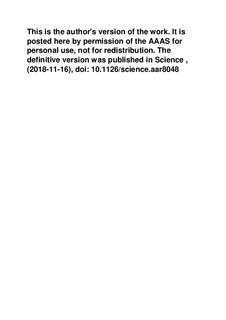Small-molecule inhibitor of OGG1 suppresses proinflammatory gene expression and inflammation
Visnes, Torkild; Armando, Cazares-Körner; Wenjing, Hao; Wallner, Olov; Masuyer, Geoffrey; Loseva, Olga; Mortusewicz, Oliver; Wiita, Elisee; Sarno, Antonio; Manoilov, Aleksandr; Astorga-Wells, Juan; Jemth, Ann-Sofie; Pan, Lang; Sanjiv, Kumar; Karsten, Stella; Gokturk, Camilla; Grube, Maurice; Evert J, Homan; Hanna, Bishoy Magdi Fekry; Cynthia, Paulin BJ; pham, Therese; Rasti, Azita; Warpman Berglund, Ulrika; von Nikolai, Catharina; Benitez-Buelga, Carlos; Koolmeister, Tobias; Ivanic, Dag; Iliev, Petar; Scobie, Martin; Krokan, Hans Einar; Baranczewski, Pawel; Artursson, Per; Altun, Mikael; Jenmalm-Jensen, Annika; Kalderen, Christina; Xueqing, Ba; Zubarev, Roman A.; Stenmark, Pål; Boldogh, Istvan; Helleday, Thomas
Journal article, Peer reviewed
Accepted version
Permanent lenke
http://hdl.handle.net/11250/2577000Utgivelsesdato
2018Metadata
Vis full innførselSamlinger
Sammendrag
The onset of inflammation is associated with reactive oxygen species and oxidative damage to macromolecules like 7,8-dihydro-8-oxoguanine (8-oxoG) in DNA. Because 8-oxoguanine DNA glycosylase 1 (OGG1) binds 8-oxoG and because Ogg1-deficient mice are resistant to acute and systemic inflammation, we hypothesized that OGG1 inhibition may represent a strategy for the prevention and treatment of inflammation. We developed TH5487, a selective active-site inhibitor of OGG1, which hampers OGG1 binding to and repair of 8-oxoG and which is well tolerated by mice. TH5487 prevents tumor necrosis factor–α–induced OGG1-DNA interactions at guanine-rich promoters of proinflammatory genes. This, in turn, decreases DNA occupancy of nuclear factor κB and proinflammatory gene expression, resulting in decreased immune cell recruitment to mouse lungs. Thus, we present a proof of concept that targeting oxidative DNA repair can alleviate inflammatory conditions in vivo.
